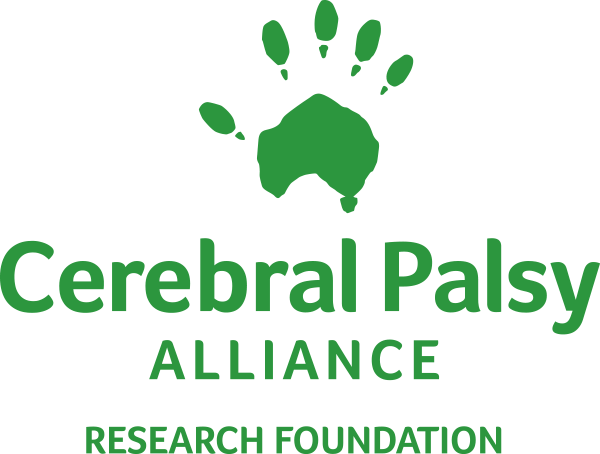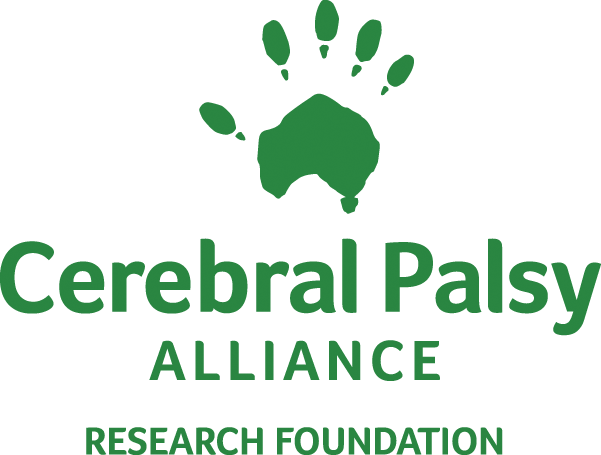
Dr Catherine Gibson
University of Adelaide – South Australia
JUSTIN GALLAGHER POST DOCTORAL RESEARCH SCHOLARSHIP $87,431
Infections, genetics and prevention of cerebral palsy
Doctors used to think that children born with cerebral palsy must have had difficult births. But new research suggests other factors may be important, such as a genetic susceptibility to infections during pregnancy, and a genetic susceptibility to problems with blood clotting.
This research project, led by Dr Catherine Gibson, will take that new research further. She hopes to learn more about infections and genetics, seeking a path to prevention of cerebral palsy. She will be using newborn umbilical cord blood samples from cerebral palsy and non-cerebral palsy infants from around Australia looking for evidence of viral infection during pregnancy.
Dr Catherine Gibson was a recipient of a Research Foundation of Cerebral Palsy Alliance 2006 Trust Innovative Research Grant of $40,000 over two years. She is a young researcher with the University of Adelaide.
Her research into the causes of cerebral palsy, which was the subject of her PhD thesis, attracted many awards and invitations to speak at international conferences. She is now continuing her post doctoral studies in the area of viruses and genetics and has been awarded a Research Foundation of Cerebral Palsy Alliance, 2009 The Gallagher Foundation / Paint a Rainbow Foundation Post Doctoral Research Scholarship of $76,931 over 3 years.
THE HENRY J COWAN GRADUATE SCHOLARSHIPS
Supports up to three students a year to the amount of $1500 per student, to pursue studies and encourage careers in the field of disability.
Physiotherapy: Emma Wilczek – University of Sydney, NSW
Occupational Therapy: Jessica Westover – University of Sydney, NSW
Speech Pathology: Berna Gurisik – University of Sydney, NSW

Clinical Associate Professor Nick Evans
Royal Prince Alfred Hospital – Sydney, NSW
AVANT INNOVATIVE RESEARCH GRANTS
$33,000 over three years
Severe Newborn Jaundice and Cerebral Palsy
Some children who develop cerebral palsy have had severe jaundice at birth or very soon after. International research shows that severe jaundice is becoming more common in many parts of the world. Is it so in Australia? Nobody knows.
Clinical Associate Professor Nick Evans and colleagues from the Royal Prince Alfred Hospital in Sydney are carrying out the first nationwide survey of paediatricians through the Australian Paediatric Surveillance Unit (APSU). The study hopes to find out if there is an opportunity to prevent some children from developing cerebral palsy.
Nick is Head of the Department of Newborn Care at the Royal Prince Alfred Hospital and the University of Sydney. He is also chair of the NSW Perinatal Services Network NICU Managers Committee and on the executive of the Australian and New Zealand Neonatal Network.

Professor Alastair MacLennan AO
University of Adelaide Women’s & Children’s Hospital North Adelaide – Adelaide, South Australia.
AVANT INNOVATIVE RESEARCH GRANTS $145,900
Genes and Cerebral Palsy
There is almost certainly not one single gene that causes cerebral palsy. However, genes play an important role in human development as well as in making us susceptible to infections, inflammation, and poor oxygen supply early in life. How we react to the latter may be as a result of our genes.
Professor Alastair MacLennan and colleagues are carrying out research involving children with cerebral palsy and their families. They are carrying out genetic analyses of samples of saliva and checking them against very comprehensive medical records. They hope to make connections between health of children with cerebral palsy and their genes.
Professor Alastair MacLennan is head of obstetrics and gynaecology at the University of Adelaide, and head of the South Australian Cerebral Palsy Research Group. His research interest lies in the apparent links between faulty genes and factors in the child’s environment, such as poor fetal growth and infections in the womb.

Dr Mary Tolcos
The University of Melbourne
AVANT INNOVATIVE RESEARCH GRANTS
$284,882 over two years
Preventing brain damage to prevent cerebral palsy
Some women develop infections in the lining of the uterus when pregnant. Some of those women become unwell due to this, while others do not.
It seems the inflammation caused by these infections is harmful to developing babies. Such inflammation before birth probably contributes to some children developing cerebral palsy after birth. Being able to prevent brain damage is one of the major challenges of research into the early years of life.
Dr Mary Tolcos and colleagues from the University of Melbourne will use animal models to study erythropoietin, or EPO, which is a naturally occurring hormone being closely examined for a range of potential uses. This research hopes to help prevent some children being born with cerebral palsy.
Mary is a medical researcher with the University of Melbourne. Her particular interest and expertise lies in examining what happens to the developing brain when it suffers potential harm from things like infections or poor blood supply.

Associate Professor David Walker
Monash University – Melbourne, Victoria
$137,040 over two years
AVANT INNOVATIVE RESEARCH GRANTS
Preventing brain damage to prevent cerebral palsy
The steady supply of oxygen throughout pregnancy is critical for the growth and development of a foetus. Recent research suggests that a poor oxygen supply at times during pregnancy can lead to particular problems with the blood vessels in the baby’s developing brain.
Associate Professor David Walker is researching whether the amino acid creatine can help prevent some of the damage to blood vessels in the brain caused by low oxygen. If the research is successful, it will be one step along the way towards preventing some forms of brain damage in children, which is very important in efforts to prevent cerebral palsy.
David is Associate Professor in the Department of Physiology at Monash University, Melbourne. He is interested in fundamental questions like how the brain develops, how we sleep and wake, and how the brain regulates the heart and cardiovascular system. He is also interested in applying this research to diseases and conditions affecting the brain in an attempt to understand how these conditions come about, and how they may be prevented.

Dr Yvonne Wu
The regents of the University of California, San Francisco campus, USA
INNOVATIVE RESEARCH GRANTS
$155,310 over two years
Genetic basis of cerebral palsy in term and near term infants
Associate Professor Yvonne Wu and colleagues from the University of California, San Francisco are examining the genetic makeup of a large group of children with cerebral palsy. They will choose 12 genes which seem to be important in causing inflammation and problems with blood clotting, and see whether they are associated with cerebral palsy.
They will perform a detailed analysis of a gene known as the interleukin-6 gene, which research suggests might be important in the development of cerebral palsy and try to match particular brain abnormalities, as seen in CT scans and MRIs, and with particular genetic traits.

Professor Alastair MacLennan AO
University of Adelaide
INNOVATIVE RESEARCH GRANTS
$600,000 over three years
A genomic basis for cerebral palsy: studies on a large Australian cohort
Genes play an important role in human development and they also play a role in making us susceptible to things like infections, inflammation, and poor oxygen supply early in life. However, we don’t all react in the same way to infections. It may be our genes that makes the difference.
Alastair MacLennan and colleagues are carrying out research involving children with cerebral palsy and their families. They are carrying out genetic analyses of samples of saliva and checking them against very comprehensive medical records. They hope to make connections between health of children with cerebral palsy and their genes.

Dr Henry Chambers
The Regents of the University of California, San Diego, USA
INNOVATIVE RESEARCH GRANTS
$10,000
One World CP Website development
A website devoted to linking professional organisations and their members, epidemiologists and grassroot organisations to improve communication and foster cooperation in research and effect policy and funding changes in countries throughout the world.
John Gilroy
Centre for Disability Studies, Sydney
DOCTORAL RESEARCH SCHOLARSHIP

Alicia Spittle
Murdoch Children’s Research Institute, Melbourne
POST DOCTORAL RESEARCH FELLOWSHIPS
$116,450
Development and prevention in cerebral palsy
A child born prematurely is about 50 times more likely to develop cerebral palsy as a child born at full term. There are many reasons for this – some known and others unknown.
Dr Alicia Spittle is carrying out research with the Murdoch Children’s Research Institute of Victoria to look at two important questions arising from this observation.
The first question relates to how the brain of a child born very prematurely develops. What are the differences between the brain development of those children who develop cerebral palsy and those who don’t?
Dr Spittle will be looking at MRI scans and developmental testing of children at various ages to see what she can learn.
The second question asks: can early intervention make a difference to the motor development of premature children? If children born prematurely receive intensive support, does it make them less likely to develop cerebral palsy? Or if they do develop it, are their difficulties with walking and coordination less severe?
Dr Alicia Spittle is now continuing her post doctoral studies and has been awarded a Research Foundation of Cerebral Palsy Alliance, 2009 Grevillea Career Development / The Bulls and Bears Researcher Post Doctoral Scholarship of $116,450 over 3 years.

